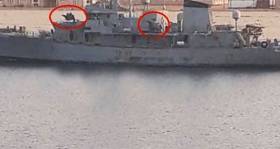Displaying items by tag: Warlord: Libya
Warlord in Libya Paid €1.35m for Ex-Irish Naval Vessel Sold by Ireland for €100,000
A former patrol vessel of the Irish Naval Service, LÉ Aisling, was sold to one of the participants in the civil war in Libya last year in breach of a UN arms embargo, the UN Security Council has been told.
According to The Irish Times, the embargo was breached by a company in the United Arab Emirates (UAE), about a year after the decommissioned vessel (see towage story) was sold by the State to a Dutch shipping broker according to a UN report.
The State sold the offshore patrol vessel for €110,000 to the Dutch company (which Afloat adds led to criticism of the price fetched). The Dutch company sold it a year later, for $525,000 (€473,000), to the company in the UAE, which almost immediately sold it to a company in Libya for $1.5 million (€1.3 million).
The details of what happened to the former Irish naval vessel are set out in a report just filed by the Expert Panel on Libya to the UN Security Council.
A spokeswoman for the Department of Defence said it had no “trailing obligations” in relation to the vessel, and that the resale of the ship was a matter for its purchaser.
Click here for more on this story on the final INS 'Emer' class patrol vessel which was commissioned into service in 1980.
























































